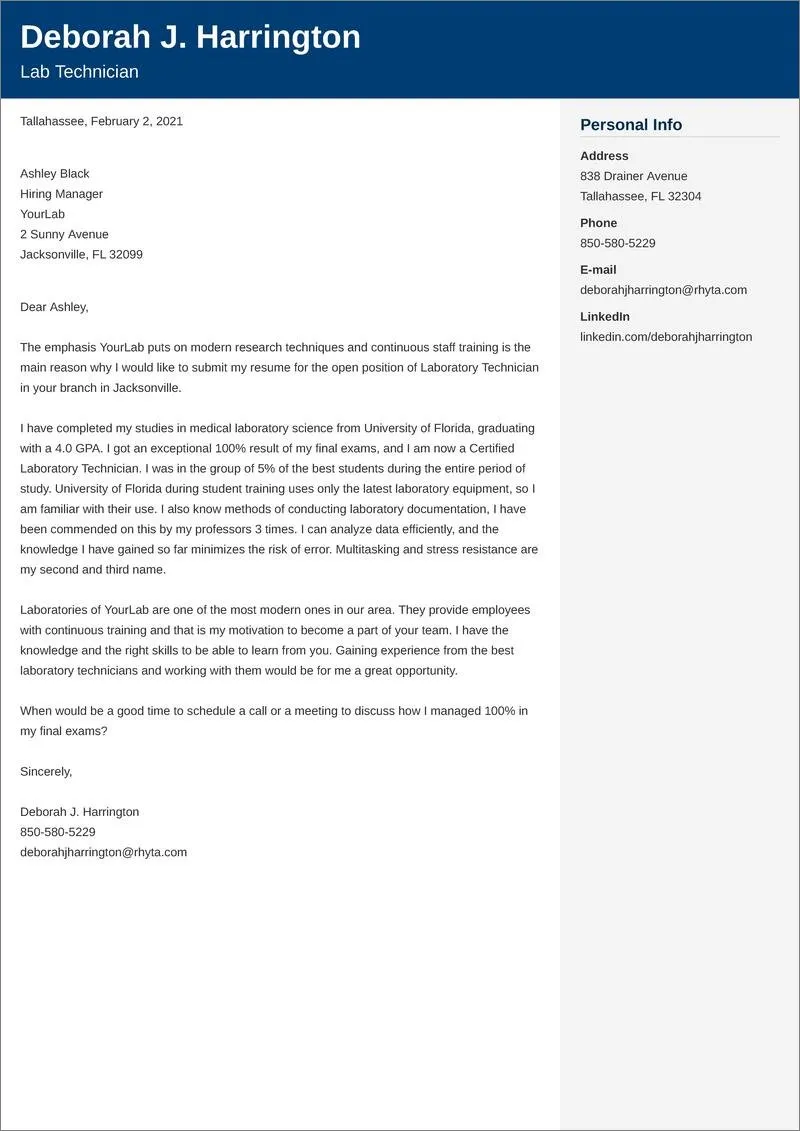What is a Lab Technician?
A lab technician, also known as a medical laboratory technician or clinical laboratory technician, plays a crucial role in the healthcare and scientific fields. They perform a variety of tests and analyses on samples of bodily fluids, tissues, and other materials. This work provides critical data that assists physicians in diagnosing and treating diseases. Lab technicians often work in hospitals, clinics, research facilities, and private laboratories, utilizing sophisticated equipment and adhering to strict protocols. Their expertise is essential for ensuring the accuracy and reliability of laboratory results, which directly impacts patient care and scientific advancements. They must possess a combination of technical proficiency, attention to detail, and a strong understanding of scientific principles.
Essential Components of a Lab Tech Cover Letter
A well-crafted cover letter is your first opportunity to make a positive impression on a potential employer. It should complement your resume and provide a detailed account of your skills, experiences, and qualifications. A lab technician cover letter is no exception; it should highlight your technical expertise, laboratory experience, and other key attributes, such as your attention to detail and ability to follow procedures. The letter should be tailored to the specific job you are applying for, which means customizing it to reflect the requirements of the position and the values of the organization. It also provides you with the space to express your enthusiasm and explain why you are the ideal candidate.
Contact Information
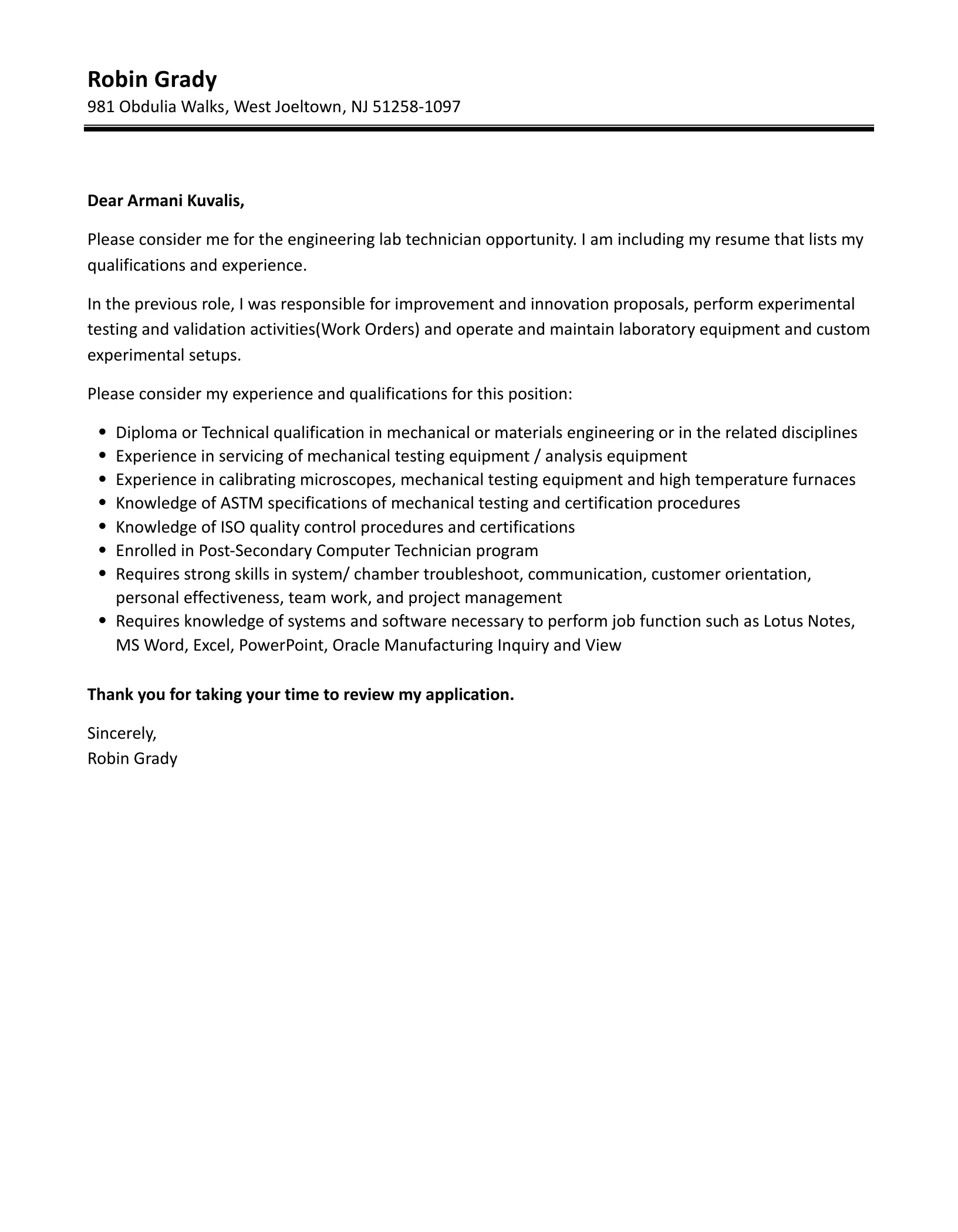
At the top of your cover letter, clearly display your contact information. This includes your full name, address, phone number, and professional email address. This ensures that the hiring manager can easily reach you if they are interested in scheduling an interview or require additional information. Accuracy here is important; ensure all the information is current and free of any errors. Using a professional email address, rather than a casual one, demonstrates your seriousness and professionalism to prospective employers. Always double-check the details to guarantee that your contact information is correct before submitting your application.
Hiring Manager’s Name and Title
Addressing your cover letter to the specific hiring manager is a great way to show that you have taken the time to research the company and the role. Whenever possible, find out the name and title of the person responsible for reviewing applications, this can often be found on the job description, company website, or LinkedIn. Addressing the letter directly is a sign of professionalism, showing that you are invested in the opportunity. If you can’t find the name of the hiring manager, use a general greeting such as ‘Dear Hiring Manager’ or ‘Dear [Department Name] Team’ instead. This shows you’ve put in an effort.
Personalized Salutation
Following the contact details and the hiring manager’s name and title, the salutation sets the tone for the rest of your letter. A formal and professional salutation is important, like ‘Dear Mr./Ms./Dr. [Last Name]’. This level of personalization will help you make a positive impression. If you are unable to ascertain the hiring manager’s name, a general greeting such as ‘Dear Hiring Manager’ or ‘To Whom It May Concern’ is appropriate. Ensure your salutation matches the overall professional tone of your letter and is respectful. A well-chosen salutation demonstrates your attention to detail and your respect for the recipient, thus setting a positive tone from the start.
Crafting a Compelling Opening
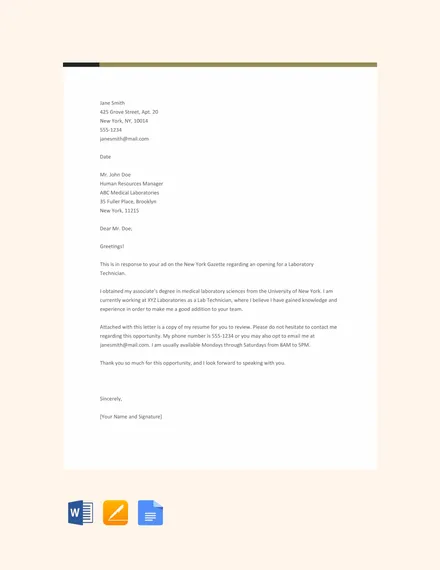
The opening paragraph is your chance to capture the reader’s attention and create a positive impression. Start with a strong statement that indicates why you are the perfect fit for the position. Mention the specific job you are applying for and where you saw the listing. Briefly highlight your relevant skills, qualifications, and experience. Make sure the opening reflects enthusiasm and a genuine interest in the position and the company. Show them you’ve done your research. A compelling opening is brief, engaging, and immediately informs the reader of your purpose and what makes you an exceptional candidate. Avoid generic or overly formal opening statements.
Highlighting Relevant Skills and Experience
The body of your cover letter should focus on how your skills and experience match the requirements of the job. Review the job description carefully and identify the key skills and qualifications the employer seeks. Use this information to customize your letter, emphasizing the most relevant aspects of your background. Provide specific examples of your achievements and accomplishments to demonstrate your abilities. Use clear and concise language, avoiding jargon, and focus on the value you can bring to the organization. Use strong action verbs to describe your responsibilities and accomplishments. Make sure to quantify your achievements whenever possible to show the tangible results you have delivered in previous roles.
Technical Skills
Lab technicians must possess a strong foundation of technical skills. Highlight your proficiency in specific laboratory techniques like specimen collection, handling, and processing. Mention any experience with laboratory equipment, such as microscopes, centrifuges, and automated analyzers. Detail your ability to perform various tests, including blood analysis, cultures, and other diagnostic procedures. Mention software or laboratory information systems (LIS) that you are familiar with. Show your skills align with the responsibilities outlined in the job description. Give specific examples of how you have utilized these skills in previous roles, including successes.
Laboratory Techniques
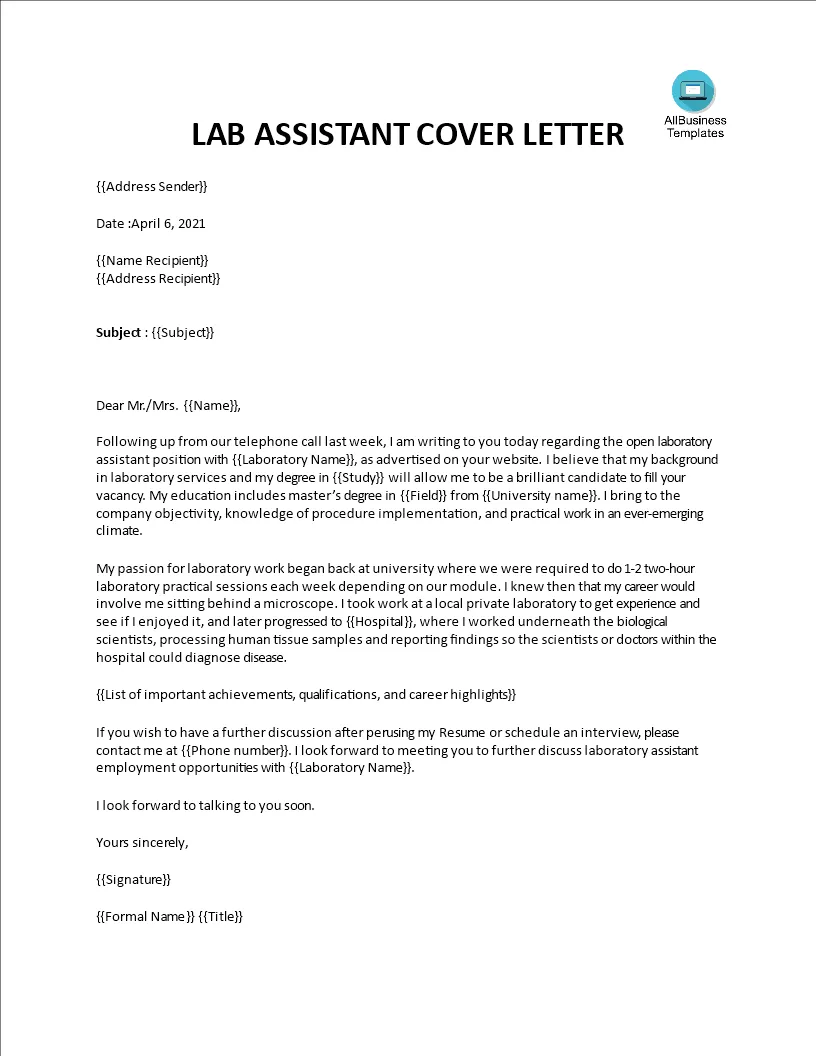
Your proficiency in specific laboratory techniques is an important asset. Highlight your experience with techniques such as PCR, ELISA, and chromatography. Mention any expertise in quality control procedures, including calibration, maintenance, and troubleshooting. Describe your experience with laboratory safety protocols, including handling of hazardous materials. If you possess specific certifications or training related to laboratory techniques, be sure to include these details. Describe situations where you had to apply these techniques and the outcomes. Be sure to showcase a thorough knowledge of different methods and their application in a laboratory setting.
Attention to Detail
Attention to detail is a critical skill for lab technicians, because accurate and reliable results are paramount in this field. Give specific examples of how you have demonstrated your attention to detail in previous roles, such as by following strict protocols, accurately recording results, and ensuring the proper handling of samples. Emphasize your ability to identify and prevent errors, as well as your commitment to maintaining quality control standards. Highlight any experience with data analysis and your ability to identify trends. Include any certifications or training that emphasize accuracy. Show how your keen eye and organizational skills contribute to the accuracy and reliability of lab procedures.
Problem-Solving Abilities
Showcase your problem-solving skills by describing instances where you had to troubleshoot issues, such as equipment malfunctions or unexpected test results. Detail your approach to identifying the root cause of the problem and implementing a solution. If you have experience with quality assurance or continuous improvement projects, be sure to mention these. Highlight your analytical thinking, and your ability to use a systematic approach to resolve challenges. Mention any training or certifications you have completed in problem-solving methodologies. Demonstrate how you approach complex problems in the laboratory setting and the impact of your solutions.
Demonstrating Accomplishments with Examples
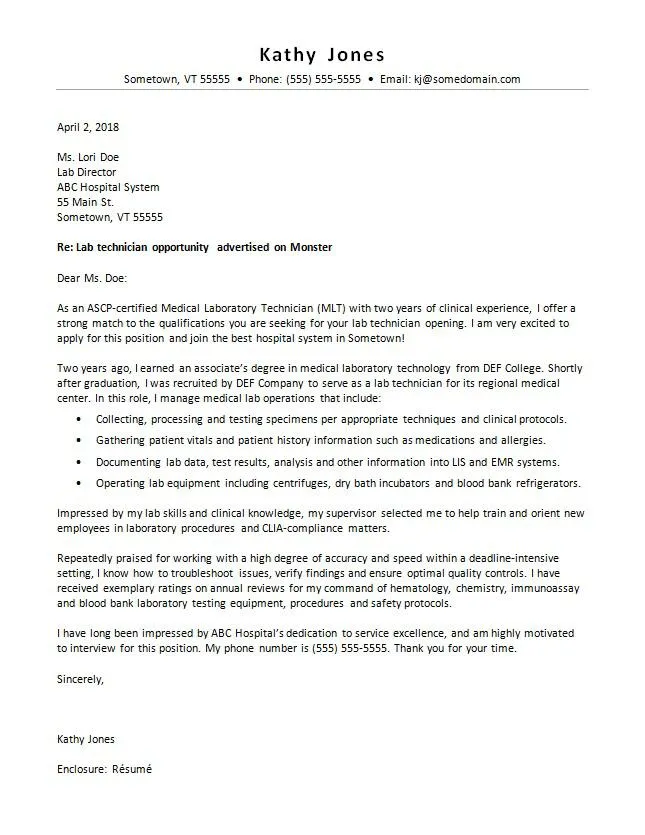
Avoid simply listing your responsibilities; instead, provide specific examples of your accomplishments. Use the STAR method (Situation, Task, Action, Result) to structure your examples. Describe the situation you were in, the task you were assigned, the action you took, and the results you achieved. Include tangible results that showcase your impact, such as improvements in accuracy, efficiency, or patient outcomes. Show the reader what you have done in the past and how that translates to the role you are applying for. Use concrete examples that demonstrate your capabilities and the value you can bring to the new organization.
Quantifiable Achievements
When describing your accomplishments, use numbers and data to quantify your achievements. Instead of stating you ‘improved efficiency’, say that you ‘increased lab throughput by 15%’ or ‘reduced turnaround time by 10%’. Use metrics and data to support your claims and make them more credible. Use percentages, specific numbers, and other quantifiable data to showcase your accomplishments. This demonstrates your ability to drive results and make a tangible difference in the workplace. Providing measurable results makes it clear how your actions have positively impacted the lab’s operations and success.
Showcasing Passion for the Field
Your passion for laboratory science can be a great asset. Demonstrate this by mentioning your interest in specific areas of lab work, such as microbiology, hematology, or clinical chemistry. Discuss any professional development activities, such as courses, certifications, or conferences, you have participated in. Mention any research projects, publications, or presentations that reflect your commitment to the field. Convey your enthusiasm for scientific investigation and your commitment to staying updated on the latest advancements. Your passion makes you stand out and shows your motivation for the lab technician role.
Expressing Enthusiasm for the Position and Company
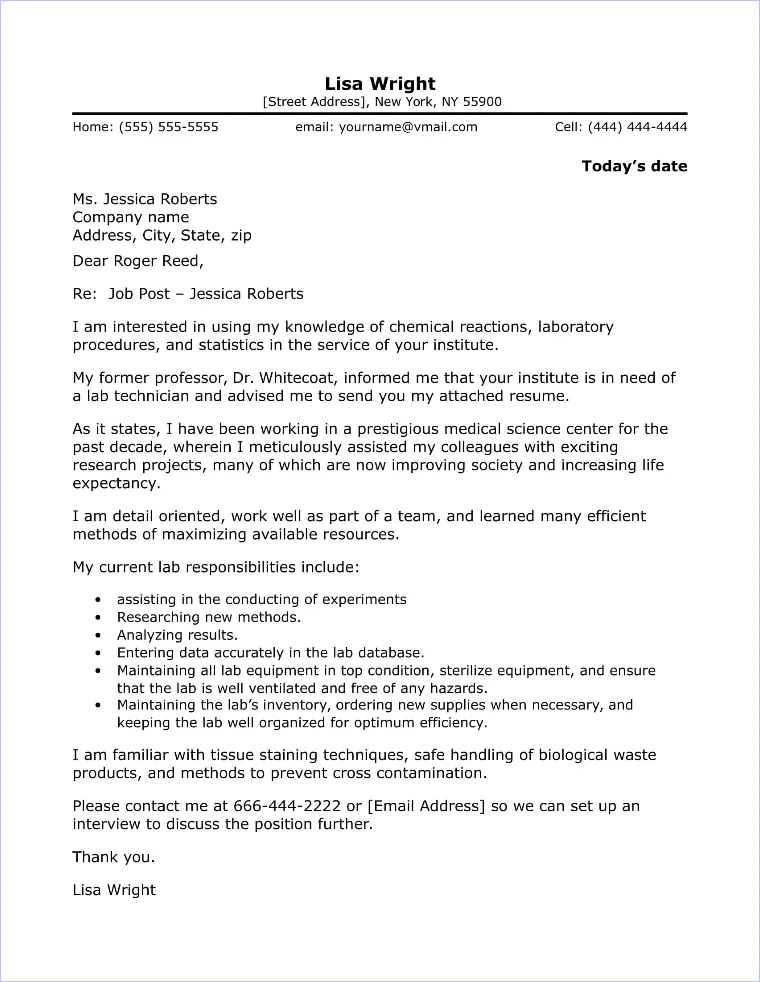
In the closing paragraphs, express your genuine enthusiasm for the position and the company. Explain why you are excited about the opportunity and how your skills and experience align with the organization’s goals. Reference something specific about the company that interests you, such as their research, their commitment to patient care, or their innovative approach. This shows that you have done your research and are genuinely interested in being part of their team. Demonstrate your understanding of their values and mission, showing you are the right fit for the company.
Closing the Cover Letter Effectively
The closing of your cover letter is just as important as the opening. Reiterate your interest in the position and thank the hiring manager for their time and consideration. End with a call to action, such as stating that you are eager to discuss your qualifications further and are available for an interview at their earliest convenience. Make sure the closing is professional, polite, and leaves a lasting positive impression. A well-structured closing reaffirms your interest and reinforces your potential to be a valuable asset.
Reiterating Interest and Availability
Reiterate your interest in the position and emphasize your eagerness to discuss your qualifications further. State that you are available for an interview at the hiring manager’s convenience. Make it simple for the reader to contact you by including your contact details again. By reiterating your interest and making it easy for them to contact you, you increase your chances of being called for an interview. This positive and proactive approach leaves a lasting impression.
Professional Closing and Signature
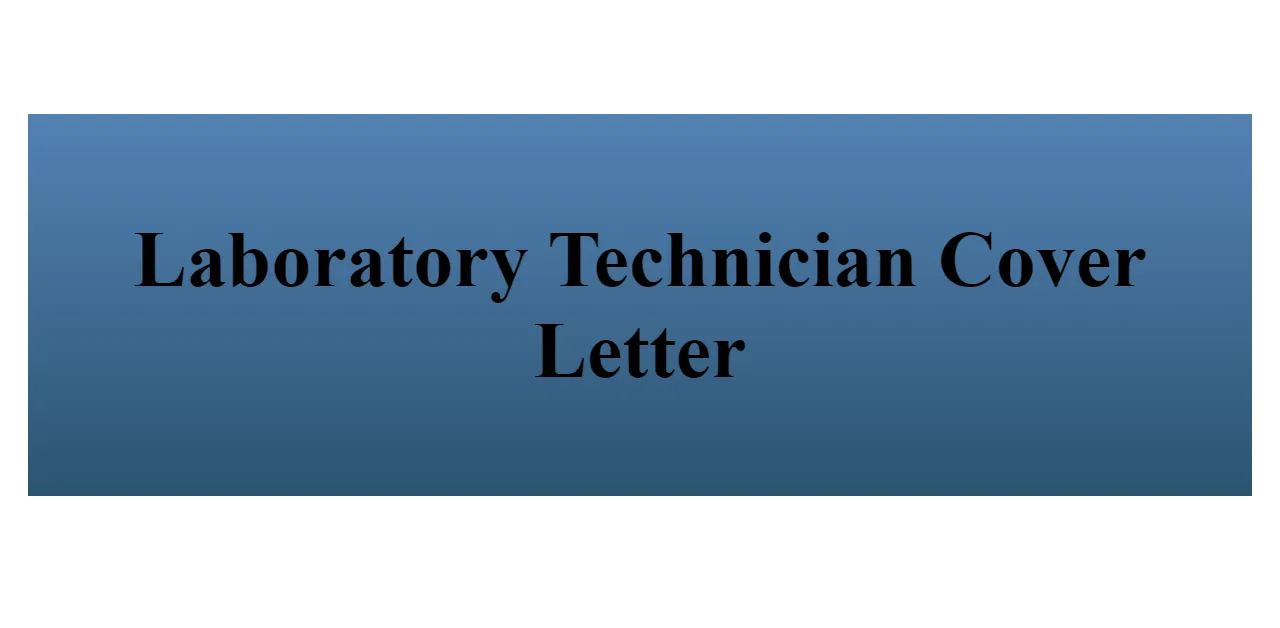
Choose a professional closing, such as ‘Sincerely’, ‘Best regards’, or ‘Yours sincerely’. Type your full name, and if you are submitting a physical copy, leave space for your signature above your typed name. This final touch adds a level of professionalism to your cover letter. Proofread the entire letter to eliminate any errors and to make sure your closing is appropriate. A well-executed closing, along with your signature, reinforces your attention to detail and professionalism.
Formatting and Proofreading Your Cover Letter
The formatting and proofreading of your cover letter are important components in demonstrating professionalism and attention to detail. Your cover letter must be easy to read, visually appealing, and free of any grammatical errors. A well-formatted letter shows that you care about presentation and that you value the details, something that is very important in the lab. Poorly formatted or error-filled letters reflect negatively on you.
Choosing the Right Font and Font Size
Select a professional and easy-to-read font, such as Times New Roman, Arial, or Calibri. Use a font size between 11 and 12 points to ensure readability. Make sure the font is consistent throughout the entire document. Avoid using overly decorative or unconventional fonts, as they can make the letter difficult to read. A clean, readable font makes a good impression and ensures your letter is easy to review.
Formatting the Letter for Readability
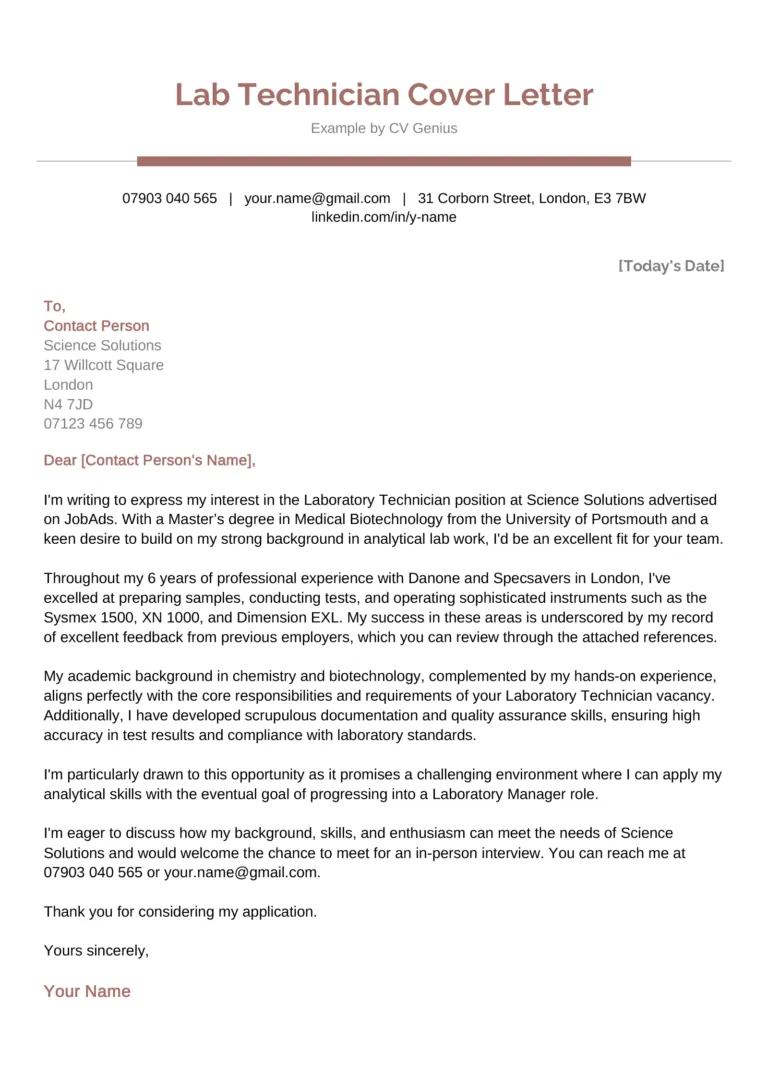
Format your cover letter for easy readability. Use standard margins (1 inch on all sides) and single-space the text with a double space between paragraphs. Use bullet points to list skills, accomplishments, or other key information. Divide the letter into clear paragraphs, each with a distinct focus. Avoid long blocks of text; break up the text with subheadings to make it easy for the hiring manager to scan and grasp the main points. Well-organized and formatted letters are more appealing and engaging to read.
Proofreading for Grammar and Spelling Errors
Always proofread your cover letter carefully for any errors in grammar and spelling. Errors can damage your credibility and make a negative impression. Use a grammar and spell-check tool, but also read the letter manually to make sure you are correct. Ask a friend or family member to review your letter for a second opinion. A clean and polished cover letter shows your attention to detail, which is critical for a lab technician position. It also reflects your professionalism.
Example Cover Letter for Lab Technician
A sample cover letter for a lab technician role is shown below. This example includes all the previously mentioned components, such as the correct formatting, the inclusion of key skills, and enthusiasm for the position. Remember to personalize this example with your own details and experiences to make it your own. This example will provide a great foundation, guiding you in crafting a compelling cover letter that highlights your skills, achievements, and passion for the field. Use this example as a guide to tailor your letter and secure your dream job.
Key Takeaways for Lab Tech Cover Letters
To create a great cover letter for a lab technician role, remember to showcase your technical skills, provide specific examples of your accomplishments, and demonstrate your passion for the field. Highlight any lab techniques experience and training. Include quantifiable achievements. Express your enthusiasm for the company and the role. Close with a call to action, requesting an interview. Carefully format and proofread your letter to create a polished and professional document. A well-crafted cover letter is an important tool in your job search. Put in the effort, and let your lab tech cover letter shine.
